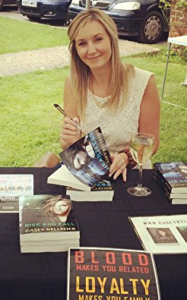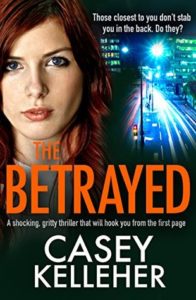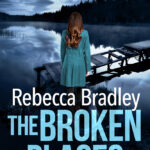 I’m thrilled to welcome Casey Kelleher to the blog to talk about her first draft process today.
I’m thrilled to welcome Casey Kelleher to the blog to talk about her first draft process today.
Born in Cuckfield, West Sussex, Casey Kelleher grew up as an avid reader and a huge fan of author Martina Cole. Whilst working as a beauty therapist and bringing up her three children together with her husband, Casey penned her debut novel Rotten to the Core. Its success meant that she could give up her day job and concentrate on writing full time. She has since published Rise and Fall, Heartless and her latest release, Bad Blood.
When you decide to write something new, what is the first thing you do?
I’m just about to start the process again as we speak, with book 8! So, already I’ve been thinking through ideas about my characters and an outline of a rough plot. The first thing I always do is invest in a lovely new notepad so that I can start jotting down any ideas that I have.
Do you have a set routine approaching it?
I like to write a very rough outline. It can often look like a lot of scribbled nonsense on a page, but I just keep writing until I get where I need to be with the story’s plot. All I need is the starting point and then I’m away.
Pen and paper or straight to the keyboard?
I only ever write my rough notes in my notebook. All my actual writing is then done on my Mac. I use Scrivener and it’s a fantastic application for authors. Being able to move chapters around to easily and to keep everything I need all in one place really makes my working life so much easier.
How important is research to you?
Research is very important. I write fiction, but of course I want my readers to believe in the story and the characters, so that means getting some of the basics like location and procedures right. The Taken was set between London and Albania, it also featured the migrant camp in Calais, ‘The Jungle.’ So that particular story required a lot more research than my other books.
How do you go about researching?
The internet is fantastic for research. I use Google Maps and Street View for my locations, and also to help me work out a realistic time line between events. I also have been lucky enough to speak to professionals regarding police procedures. The lovely David Gaylor – Peter James’ real life Roy Grace and ex-Detective Inspector, has helped me with some of my books police procedures. I’ve also spoken to Morticians, Cemetery Managers, Doctors, and Customs officers.
Speaking to people is when I find out the real gritty bits of information. That first hand experience is invaluable for finding out the things that you can’t always find on a search engine.
How do you store everything; ideas, research, images that catch your eye?
I write notes. Often on my phone as that’s always with me. I also try and jot things down on the rough draft of my manuscript too. No matter how many times I see something or hear something and I think that I don’t need to write it down, I do. I always forget it. So I’m trying my hardest to always make a note as soon as something comes to my mind.
Tell us how that first draft takes shape?
Slowly and often painfully. I’m trying to do sprints and get the story out quicker initially, but I often go back on myself and go over the smaller detail. It’s something I’m working on. I’d like to get a first draft out and then perfect it afterwards, but I have a terrible habit of having to keep going back on myself to make edits.
 Are there any rituals you have to do or items you must have with you while writing that draft?
Are there any rituals you have to do or items you must have with you while writing that draft?
I have to write in silence. Some authors listen to music, or have the TV on in the background, but I find any noise a real distraction. As long as I have a nice cup of coffee to drink, and my little dog at my side for company that’s all I need.
Does the outside world exist or are you lost to us for a period of time as the magic works?
I do sometimes get lost in the moment whist writing, but I work in short bursts. That seems to work well for me. It means that I can still get other things done at home during my working day. Having three teenage son’s doesn’t leave much room for getting lost.
Edit as you go or just keep getting words out?
I want to just get the words out, but I’m a nightmare for wanting to edit as I go along. Doing writing sprints is the only thing that helps me to stay focused on my word count. I think I’m mastering this with each book I write, but I’m not quite there yet.
I see many writers counting words in a day. Word counter or other method of keeping track of progression?
I try to do a word count. 1500 words a day is a good amount for me generally, however with this next book I’m really going to try and get that very first draft out quicker. So I’m hoping to aim for at least 2500 a day.
So, that first draft is down. Roughly how long did it take? And what shape is it in?
The first draft, for me, is always the hardest part of the process.
I’d say the first draft normally takes me about 10 weeks. It’s often a mess, but it’s a very good place to start really piecing everything together properly once the story is done and down on paper.
In what format do you like to read it through, ereader, paper or the computer screen?
I like to read my work back on the computer, then if I spot any errors or changes that need to be made, I can do them there and then as needed.
What happens now that first draft is done?
Once I’m happy with the first draft, I start again from the beginning. Making notes, getting ideas, checking the timeline and the links between the characters. Then I work my way through my manuscript from the start, generally making the whole story tighter.
Then when I’m happy with it all, I send it over to my editor before stepping away for a few days/weeks depending on my schedule.
I think stepping away from the story really helps. It means that you can go back to it with fresh eyes and fresh enthusiasm and of course, that’s when the real fun begins… with the dreaded edits!
Thanks for digging into the depths of the first draft. It’s been a pleasure having you.
You can find Casey on her Website | Facebook | Twitter
The Betrayed
 Those closest to you don’t stab you in the back. Do they?
Those closest to you don’t stab you in the back. Do they?
Jimmy Byrne is one of the biggest faces on the Soho scene. Equally feared and respected, he’s clawed his way to the top. Money is his game, and he’ll make it by any means necessary.
When Jimmy sets his sights on shy young Colleen Walsh, she is quickly seduced by his sweet words and the life of luxury he offers her. But behind the diamonds and fur coats lies the reality of gangland violence – and by the time she realises the truth, she’s already in too deep.
Like her father, Jimmy Byrne, Nancy Byrne is strong, opinionated – and ruthless. But when Jimmy is murdered. Nancy vows to find the killer and make them pay for their actions.
Only the perpetrator is someone close to home. Someone she trusted. Someone who betrayed them all.
Blood is thicker than water – but Nancy is not afraid to spill some to get the truth.
Those closest to you don’t stab you in the back. Do they?
Jimmy Byrne is one of the biggest faces on the Soho scene. Equally feared and respected, he’s clawed his way to the top. Money is his game, and he’ll make it by any means necessary.
When Jimmy sets his sights on shy young Colleen Walsh, she is quickly seduced by his sweet words and the life of luxury he offers her. But behind the diamonds and fur coats lies the reality of gangland violence – and by the time she realises the truth, she’s already in too deep.
Like her father, Jimmy Byrne, Nancy Byrne is strong, opinionated – and ruthless. But when Jimmy is murdered. Nancy vows to find the killer and make them pay for their actions.
Only the perpetrator is someone close to home. Someone she trusted. Someone who betrayed them all.
Blood is thicker than water – but Nancy is not afraid to spill some to get the truth.



Had to grin ruefully in recognition when Casey said that, no matter how often she thinks she won’t forget a detail even if she doesn’t write it down, she will. So true! I also liked the sound of The Taken, even if it’s not the most recent book. I’ll have to check that one out!
The first draft is the toughest for me as well. And while the Internet is great for research, speaking to real people does give you things you wouldn’t find elsewhere.
It’s always so nice to learn how other writers go about it. Thanks, both, for an interesting interview. And I know just what you mean about needing a good up of coffee and your dog. That’s the way I am, too.